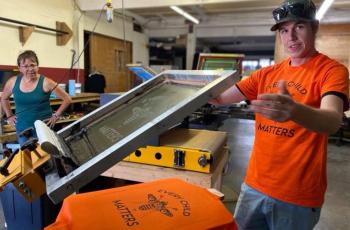Image Caption
Summary
Local Journalism Initiative Reporter
Windspeaker.com
For Devan Carter of Kwikwasut'inuxw Haxwa'mis First Nation, making orange t-shirts is a way to amplify voices that Canada and the churches have tried to silence, he said.
Carter opened his Indigenous screen printing company Flowlife Design in Campbellton, B.C. in June.
“We have been selling orange shirts to support survivors of the tragedy that has happened all across Canada,” Devan said of the residential school system and of the children’s remains located in unmarked graves at former residential school sites in recent months. A portion from his orange t-shirt sales goes to the Orange Shirt Society.
Flowlife was open on Canada Day and the shop was humming with people coming in for the shirts.
“It’s usually a flood of red in town. This year it was a flood of orange t-shirts,” Devan said.
He is an electrician by trade and has been working as an electrician for 13 years. In late winter, he had the inspiration to start his company.
Devan believes in the importance of family and working together. His dad and brother work together running Vicar Electric. And now he and his mom, Liz Carter, are working at Flowlife Design.
His cousin William Wasden from Port Hardy designed the Kwakwaka’wakw bee for the orange shirts. The bee signifies community and preservation of culture.
“We chose the bee because bees are very family orientated,” Devan said. “They all worked together as a community like we Indigenous people.
“The bees are in danger at this time, too.”
Liz is a mixed media artist from Yalis, also called Alert Bay. Her long dark hair is piled into a bun as she works in the large silk screening workshop.
Through her own work, Liz explores communicating loss and resistance.
“Our parents hid those things. We love oolichan grease. It's a staple for most of us. She used to close the curtains and line all the counters, and cover everything up, so it wouldn't get on anything. She took such care, covering everything. I look back at it now and it looks like a ceremony, but she was hiding part of her culture. She didn't want anyone to know she was eating that kind of food, I guess. Now I'm familiar with ceremony and I see it was a form of ceremony for her.”
The workdays of the mom and son team are filled with story sharing. When survivors come in for a shirt, there is a need to speak.
Elders are finally feeling free to use their voice, Liz explained.
“Having these shirts has brought so many Indigenous people into the shop. And we sit here on a daily basis hearing stories that they haven't told ever, ever before,” said Liz.
“The shirts, and all these stories of these lost children, have broken those barriers down.”
Fighting off tears, and sometimes not fighting them off as all, Liz and Devan marvel over the strength of survivors.
“The strength of our people to walk that road in silence for so long is amazing. And I'm glad they're talking about it now though, because those stories really need to get heard,” Liz said.
Devan has had a lot of non-Indigenous people come in looking for orange t shirts as a way to show support. He remembers a woman who had come in, outraged that she was not taught this history in school.
Devan had been raised with more culture than she was, Liz said. They know the impacts of residential schools, and she's working to fill in the gaps by sharing what she knows about her culture and language with the next generations.
“It's brought us closer together and it's certainly opened up conversations like beyond the shop, out in the world. Everybody's talking, with these shirts, and supporting and I'm hopeful there's change on the way,” Liz said.
“I look at it as those children, they've come back fighting and they’ve got a voice through it after all.”
Local Journalism Initiative Reporters are supported by a financial contribution made by the Government of Canada.

